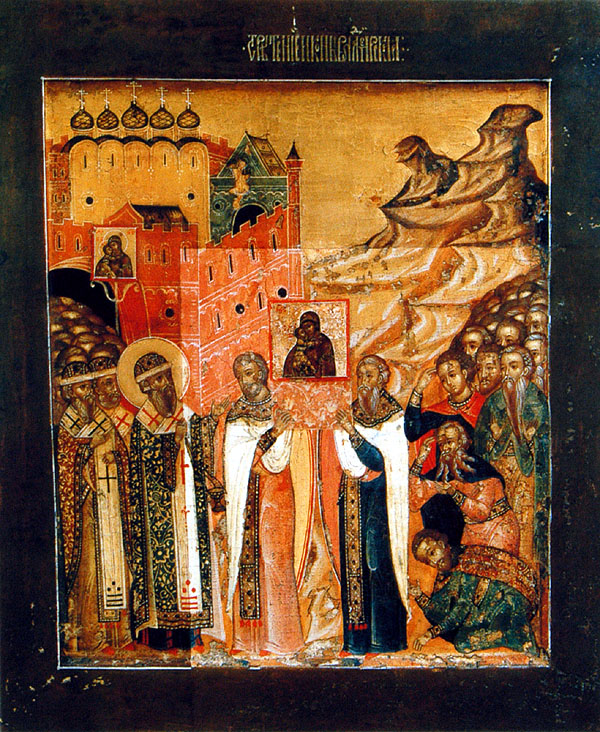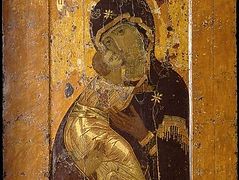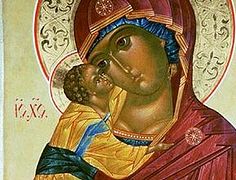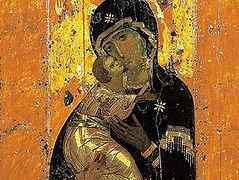In the summer of 1395, there was an event that left a profound impression on the spiritual and historical life of the Russian people, and which became forever an example of faith and hope in God’s Providence and in the intercession of the Most Holy Theotokos.
Awful news had come to Moscow: From the South, the cruel and heretofore invincible conqueror Tamerlane (Temir) and his host were moving toward Moscow. He was literally invincible, for in his entire long life, he had never suffered a defeat. Tamerlane had attacked and conquered Persia, Iraq, Armenia, Azerbaijan, Mesopotamia, Georgia, India and Syria. In 1405, toward the end of his life, his domain West to East stretched from the Black Sea to the Ganges River, and from North to South, from the Aral Sea to the Arabian Sea.
In 1395, this awesome conqueror of almost the whole of Asia Minor and the Caucusus set out against Rus’, reaching the Ryazan frontier, devastating the town of Yelets, and moving toward Moscow, came to the headwaters of the Don. Leading Moscow’s armed forces, Grand Prince Vasily Dmitrievitch courageously came out to Kolomna to meet the foe, but everyone understood that their forces were greatly outnumbered.
At that great and decisive moment in history, it was not only a question of whether Moscow would survive—the survival of the entire Russian State was at stake. Metropolitan Cyprian of Kiev and All Russia, head of the Russian Orthodox Church, understood this best of all. On blessing Prince Vasily to go into battle, he called upon all of the people of Moscow to repent, to pray fervently, and to fast. Then, he was divinely inspired to send a delegation of clergy and boyars to Vladimir to bring back with them that great holy treasure of Rus’, the Vladimir Icon of the Mother of God.
In a grand Procession of the Cross lasting ten days, they brought the Icon to the capital. Along the entire route, the Icon was surrounded by an enormous mass of people who, kneeling, continually cried out, “O Mother of God, save the Russian land!” The Metropolitan, the Great Prince’s family, the clergy, boyars, and people of Moscow, with tears in their eyes welcomed the Most-holy Theotokos on Kuchkovo Field.
Today, the street along which the Procession of the Cross from Vladimir moved is called the “Sretensky,” from the Slavonic “sretenie,” meaning “meeting.” The gates that were later erected on the site of Kuchkovo Field became known as the Sretensky Gates.
All of Rus’ then prayed before the Icon of the Mother of God to be saved from certain defeat.
And a miracle occurred.
Tamerlane reached the town of Yelets, and due to circumstances unknown to historians moved no farther toward Moscow, although the city lay before him, almost defenseless, an easy conquest and a great military prize. This happened on August 26, 1395.
However, in the chronicles, Tamerlane’s intriguing decision is explained as follows: As the residents of Moscow were meeting and praying before the Icon, Tamerlane was asleep in his tent. Suddenly, there appeared before him a majestic woman, bathed in brilliant radiance, who menacingly ordered that he leave the lands of Moscow. Waking in terror, Tamerlane called together his advisors and asked them the meaning of his vision. They replied that the majestic woman was the Mother of God, the great defender of the Christians. According to the chronicles, it was for this reason that the very next day, a terrified Tamerlane turned South.
Metropolitan Cyprian established the Sretensky Monastery on the site of the meeting of the Vladimir Icon, and ever since, August 26 (September 8, New Calendar) has been celebrated as the date Moscow and Russia were saved from Tamerlane and his horde.
All of this dramatic history is well known by Orthodox people. Less well known are subsequent events also resulting from prayers of the Russian people throughout its history. Upon turning South, Tamerlane and the Golden Horde began an enormous campaign of conquest. Within one year, all of the cities of the steppes, then ill-disposed towards Rus’, were looted and destroyed. Khan Tokhtamysh, who in 1382 burned down Moscow in vengeance for his defeat at Kulikovo Field, fled to Lithuania. After that total defeat, for all intents and purposes, the Golden Horde ceased to be a civilization of the steppes, a single state. For Rus’ that event had enormous significance.





